Confucianism
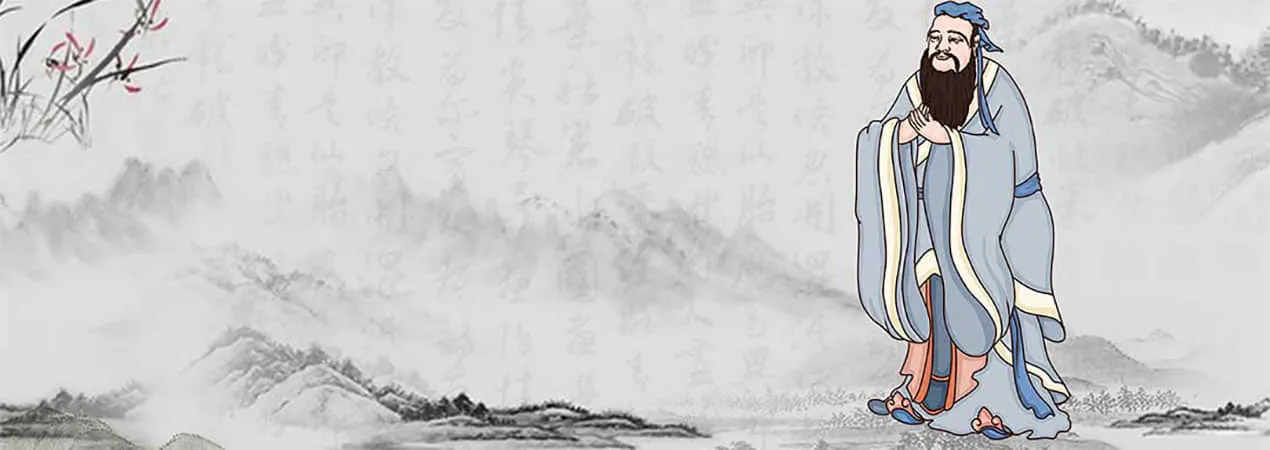
Confucianism was created by Confucius (551 BC – 479 BC), who was an ideologist and educationist. Confucianism has been the orthodox ideology in China for over 2,000 years and Confucius enjoys the reputation of a saint in China.
Historical Background of the Creation of Confucianism
Confucius lived during the Spring and Autumn Period (770 BC – 476 BC), during which time the slave society in China was ending and the feudal society was budding. However, the owners of the rights of the slaves were not willing to lose their privilege. They tried their best to control the rising feudal lords’ power by instilling old and backward ideology. Confucius believed that feudalism was more advanced than slavery and the society needed a new ideology to guide people in the abolishment of slavery, so he created Confucianism. The core concept of the Confucianism is benevolence, which was welcomed by both the slaves, who wanted to be free, and the feudal lords, who just wanted a labor force, but not the responsibility of people’s lives.
Development of Confucianism
When Confucianism was created, there were also hundreds of other ideologies created at the same time. Qin Shihuang (259 BC - 210 BC) the first emperor of the feudal dynasties in China, announced that Legalism was the orthodox ideology. Thousands of books about Confucianism were burnt and people who believed in Confucianism were buried alive. He thought his dynasty could last forever because of his cruelty. Fortunately, it lasted only 14 years.
The Han Dynasty (202 BC – 220 AD), next to Qin Shihuang’s short lived dynasty, it was the second feudal dynasty in China. Liu Che, the seventh emperor of Han Dynasty and one of the most outstanding emperors in the history of China, began to understand the importance of Confucianism. He ordered his prime minister Dong Zhongshu, an economist and ideologist, to combine the original Confucianism with other ideologies to form a new Confucianism. Everyone at that time was only allowed to learn the culture based on the new Confucianism. Different from Qin Shihuang’s Legalism, the new Confucianism was widely accepted by common citizens at that time. Because the keystones of Confucianism combined with the common people’s sense of worth, this new ideology was taught and learnt spontaneously.
Corner Stones of Confucianism
Benevolence, righteousness, courtesy, wisdom, honesty, forgiveness, loyalty, filial piety and respect to elder brothers are the nine corner stones of Confucianism.
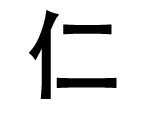
仁 rén Benevolence
Benevolence
Benevolence requires people to love and help each other. If someone is in trouble, everybody should be ready to give assistance, even though the one who helps does not know the one who accepts help. In a slave society, the emperors showed no benevolence towards their slaves. In time their countries were overthrown with the slaves revolted. In feudal societies, the emperors often reduced or exempted tax when there was a lean year or natural disaster. This was the primary way for the emperors to show their benevolence to their citizens. The indispensability of benevolence has been proven in China’s history. When the emperors were benevolent, their countries were got prosperous and had peace. If they did the opposite, they lost everything.
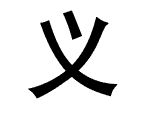
义 yì Righteousness
Righteousness
Righteousness requires everyone to comply with the values, rules and laws that have been agreed by most people. For example, when a senior citizen falls down in the road, the passersby should help the fallen citizen to stand up or find a doctor for that person. This has been a part of public morals since ancient times. But now, people are not so kind-hearted. So the righteousness is perhaps the most neglected factor of Confucianism in China.
It can be deduced that the righteousness perhaps absorbed some concepts from the Legalism due to the laws described in the righteousness. Confucianism requires everyone should do what the law allows. People who violate the laws must be punished. In some very severe cases not only the criminals themselves, but also their families would be sentenced to death. In ancient times, there were incredibly cruel executions, such as tearing a person asunder using five carts to dismember a person’s body piece by piece. In a word, these punishments against criminals were not more clement than the ones seen during the times of slavery.
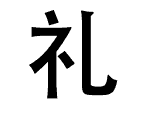
礼 lǐ Courtesy
Courtesy
China enjoys a reputation of being a courteous country, because Chinese people have been taught to be polite to others since childhood. Confucianism believes courtesy can make everyone respect each other. This respect is one of the basic factors in doing something successfully. There should be courtesy between emperors and common citizens, between fathers and sons and between husbands and wives. However trying to be polite is only what Chinese people are being taught to do and nowadays Chinese people are becoming more and more impolite, perhaps because they have a lot of difficulties today. Their neighbors, the Japanese and Korean, are much more polite than Chinese having learnt courtesy from Chinese in ancient times and developed it much better way.
Courtesy is not only about the respect between people, but also about people’s respect to the gods. Ancient Chinese believed there were gods in the sky and in the rivers, sea, mountains and fields. Their ceremonies were the way to show their respect to the gods. Almost the in the same way as the western world, cattle, fowl, jewelry, ceramics and even human beings were the major sacrifices in ancient China.
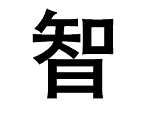
智 zhì Wisdom
Wisdom
Wisdom requires people to learn to know knowledge. Only knowledge can make the people and society improve continuously. There have been plenty of books about the Confucianism. If people wanted to become government officials, they had to learn the knowledge in these books and pass an examination based on these books.
This exam system showed a promising way for common people at the beginning, but it became a barrier to preventing the development of productivity after the 14th century. When the western world was developing Capitalism, Chinese people were still being tied to the exam system. They got very high scores in exams, but could do nothing in the world outside book knowledge. Finally, China became too weak to defend the invasion from the western world.
Even now, the negative aspect of the wisdom of Confucianism is still affecting Chinese people. So many Chinese people get the top exam results, but find it difficult to find jobs for themselves after graduation.
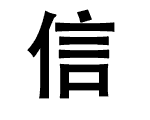
信 xìn Honesty
Honesty
Compared with other cornerstones of Confucianism, honesty is relatively easy to understand. Without honesty, and without trust there will finally be no development and teamwork.
Teamwork is a weak point for Chinese people. Chinese athletes often get gold medals in individual races in the Olympic Games, such as table tennis, diving and badminton, but for the team races, such as football and basketball, China is still struggling in the qualifying matches.
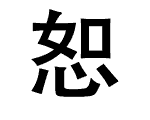
恕 shù Forgiveness
Forgiveness
People always say “It will hurt yourself more if you do not forgive others” which is easy to say than really do it. Confucianism believes people cannot avoid to offend each other in daily life and work. If they do not forgive each other, they cannot cooperate with each other and will fail in everything. The ancient psychology actually originated from the Forgiveness of the Confucianism.
The Benevolence is basic on the Forgiveness.
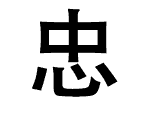
忠 zhōng Loyalty
Loyalty
In order to keep their country, the emperors of feudal dynasties in China always emphasized the loyalty, which required citizens give their all to their country, including their lives. The loyalty was necessary to keep a steady society, but if the emperors showed no mercy to the citizens, the country could still be overthrown.
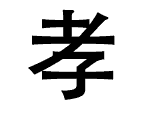
孝 xiào Filial Piety
Filial Piety
Feudal emperors believed every family was a small society and that their country could not be steady unless most families in the country were steady. Filial piety is one of the most important factors to keep families steady, so the feudal emperors believed that by emphasizing filial piety families would produce more children. A large population meant prosperity in ancient times.
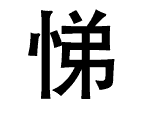
悌 tì Respect to
Elder Brothers
Respect to Elder Brothers
The average life span in ancient China was only around 30 years. When the parents of a family died, the oldest brother became the leader of the family. The respect to the oldest brother became the key factor to keep a family steady.
Famous Confucianism Ideologists
There are many ideologists in Confucianism, and each of them have made a great contribution for the establishment, development and promotion of Confucianism.
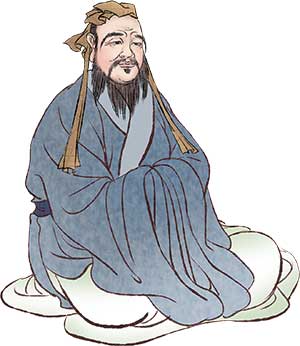
A portrait of Confucius
Confucius (551 – 479 BCE), known in China as Kongzi, with the given name Qiu and alias Zhongni, was a Chinese philosopher, the founder of Confucianism, and teacher and politician during the Spring and Autumn Period (770 – 221 BC). The core of Confucian thought is Benevolence and Courtesy. His principals presented the spirit of order to the feudal society.
Mencius (372 – 289 BCE), also known as Mengzi, was a Chinese philosopher who is the most famous Confucian after Confucius himself. He developed orthodox Confucianism and was regarded as the ‘Secondary Saint’. His main theories include that of “benevolent government”, believing that ”the people are more important than the monarch”.
Xunzi (313 – 238 BCE), who lived at the very end of the Warring States Period (475-221 BCE) after Mencius, was an ideologist and politician. He stressed that human nature is evil. Holding the opposite opinion to Mencius’ idea that human nature is good, he believed that education and environment would have a great influence on people.
Dong Zhongshu (179 – 104 BCE) was a philosopher, a politician, and a writer during the Han Dynasty (202 BCE – 8 CE). He is traditionally associated with the promotion of Confucianism as the official ideology of the Chinese imperial state. Combining Confucian thought with the society of that time, a new ideology was formed, and his thought which “only venerated the Confucian and expelled all other philosophical schools” was supported by the emperor as the guardian of rulership. He supported both "mutual correspondence between Heaven and man" which means that any change or process in the world reflected a change in Heaven’s stance toward the ruler, and the “Divine Right of Kings”.
Cheng Yi (1033 – 1107 BCE) was a Chinese philosopher who influenced the development of the rationalist school of Neo-Confucianism, as well as an educator in the Northern Song Dynasty (960 – 1127 BCE). Cheng Yi based his philosophies on an understanding of the “li” (principle), a basic force that governs proper behavior in all things. His philosophy emphasized that the way to discover “li” is to investigate the myriad of things in the universe in which “li” is present. He espoused many methods of investigation – induction, deduction, the study of history and other disciplines, and participation in human affairs. Cheng’s writings have been gathered in the “Chengyi wenji” (Collection of Literary Works by Cheng Yi), the “Jing-shuo” (Explanation of the Classics), and the “Yi zhuan” (Commentary on the Book of Changes).
Zhu Xi (1130 – 1200 BCE), a decade after Cheng’s death, began to expand Cheng’s ideas into what came to be called the “Cheng-Zhu” (for its two most important exponents) rationalist school of Chinese philosophy; it dominated official circles until the Chinese Revolution of 1911 – 1912.
Gu Yanwu (1613 – 1682 BCE), was a philosopher, Confucianist, and historian in the late Ming Dynasty and early Qing Dynasty (1600 – 1644 BCE). He was critical towards the Neo-Confucian “li” (teachings of the universal principle) and developed his own ideas about the cosmos and human nature. He strongly encouraged scholars to return to the simple, ethical precepts of early Confucianism. His best known works are the selected essay “Rizhi lu”, and “Gu Yanwu Shiwen ji” (Collected Poems and Essays).
Wang Fuzhi (1619 – 1692 BCE) was a philosopher of the early Qing Dynasty. Wang’s own philosophy emerged as a new form of qi-naturalism derived from “The Book of Changes”, as well as a new form of moral psychology informed by Mencius’ conviction of the goodness of human nature. He was a materialistic thinker, and maintained that all reality consisted of "ch'i" (energy or material force). Heaven was nothing more than the totality of all objects which existed, and the Confucian principle of “li” (idea, form) was simply a principle of ch’i. Wang's naturalist moral philosophy acknowledged desire as an essential part of human nature and declared that virtues and values are assigned to objects and actions by human beings and not by Heaven.
Classics
Confucian culture dominated during feudal times. The classics of Confucianism, “The Thirteen Classics” have been respected by scholars with great influence. Without reading these classics, people cannot understand and research the Chinese feudal society.
The Thirteen Classics, generally, refers to the group of thirteen books of Confucianism that became the basis for the Imperial Examinations during the Song Dynasty. Of these Confucian masterpieces, the most important is “Classics” (Jing), the second is “Commentaries on the Spring and Autumn Classics” (Zhuan), and after that is “Record” (Ji), and the last is “The Erya Glossary”.
The Thirteen Classics
The Book of Changes (周易 zhōu yì ):
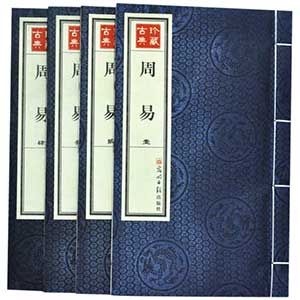
The Book of Changes
The Chinese name is ‘Yi Jing’, although it is sometimes known as ‘Zhou yi’ and ‘I Ching’, and it is the product of a long tradition of divination lore. It is possible that ‘I Ching’ originated from a prehistoric divination technique which dates back as far as 5000 BCE. It is an influential text, read throughout the world, the content of which includes philosophy, politics, religion, psychoanalysis, literature, and art.
The Book of Documents (尚书shàng shū):
This is a collection of orations made by rulers and important ministers from mythical times to the middle of the Western Zhou period, and it is a rare historical record about ancient economy, geography and society.
The Book of Songs (诗经 shī yīn):
The Book of Songs is a collection of the 305 earliest recorded Chinese poems dating from 1100 – 600 BCE, although the authors of most of the poems in the book cannot be identified.
The Book of Etiquette and Ceremonial (仪礼 yí lǐ):
‘Yili’, also called ‘The Book of Etiquette and Ceremonial’, is a Chinese classic text about Zhou Dynasty social behavior and ceremonial ritual as it was practiced and understood during the Spring and Autumn Period. It records ritual mainly for scholar-officials, including the capping ceremony, weddings, funerals, sacrifices and other etiquette. Along with ‘Rites of Zhou’ and the ‘Records of Rites’, it formed the “Three Rites” of the “Thirteen Classics”.
The Rites of Zhou (周礼 zhōu lǐ ):
The ‘Rites of Zhou’, also known as ‘Zhou Li’, depicts the royal official royal system of the Zhou Dynasty (1047 – 771 BCE) and the national systems in the Warring States Period (475 – 221 BCE).
The Canonized Commentaries on the Spring and Autumn Annals:
The Commentary of Zuo (左传 zuǒ zhuàn ):
Zuo zhuan is a history chronicling the years 722 – 468 BCE, and an important historical source for studying the history of that period.
The Commentary of Gongyang (公羊传 gōng yáng zhuàn):
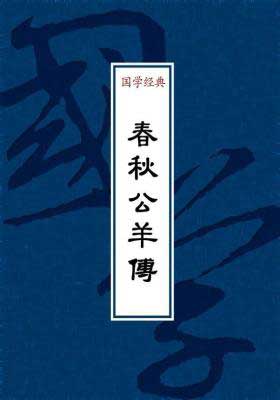
The Commentary of Gongyang
Different from the statement of history in ‘Zuo zhuan’, the ‘Commentary of Gongyang’ puts emphasis on the commentary of “Spring and Autumn Annals” that is one of classic books of ancient Chinese. The Gongyang Commentary works with a question-and-answer pattern to explain the political meaning of a particular event or action. All explanations fit into the Confucian concept of the ideal sociopolitical order.
The Commentary of Guliang (谷梁传 gǔ liáng zhuàn):
Like the ‘Gongyang Zhuan’ , ‘Guliang Zhuan’ is written as dialogic explanation of the political and social condition of the “Spring and Autumn Annals”. Along with the ‘Zuo zhuan’ and ‘Gongyong Commentary’, this work is one of the “Three Commentaries on the Spring and Autumn Annals”
The Confucian Analects (论语 lún yǔ):
This is a collection recorded by Confucius’ disciples of the sayings, ideas and life stories of Confucius and his contemporaries.
Master Meng (孟子 mèng zǐ ):
‘Mengzi’ is a collection of the Confucian philosopher Mencius’ stories and his discussions with rulers, disciples and adversaries.
Records of Rites (礼记 lǐ jì):
‘Liji’ is a collection of descriptions of ritual ceremonies of the pre-Qin Dynasty (21 – 221 BCE), and depicts the moral principles of subjects such as royal regulations about the development of rites, ritual objects and sacrifices, education, music, and the behavior of scholars.
The Book of Filial Piety (孝经 xiào jīng):
“The Book of Filial Piety”, also known by its Chinese name as ‘Xiaojin’, is a book giving advice on how to behave toward a senior, such as a father, an elder brother, or a ruler.
The Erya Glossary (尔雅 ěr yǎ):
This is the oldest Chinese dictionary from the Han Dynasty (206 – 220 BCE). Erya collects rich Chinese vocabulary from ancient times, but the author is not known.

 Chinese Operas
Chinese Operas  Chinese Kung Fu
Chinese Kung Fu 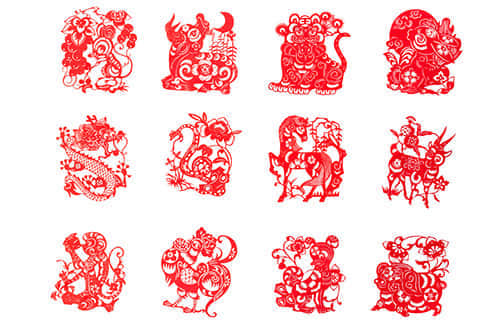 Chinese Zodiac
Chinese Zodiac 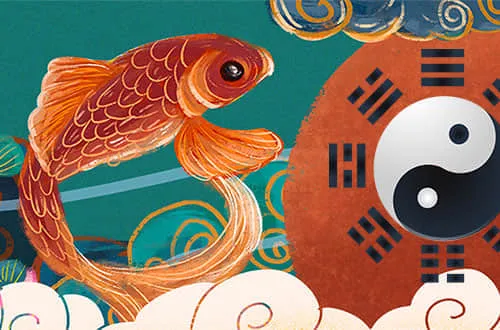 How to be Lucky in China
How to be Lucky in China